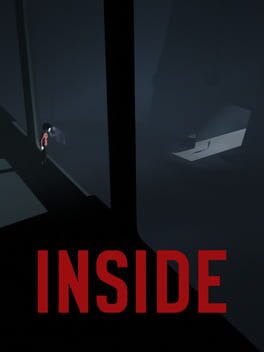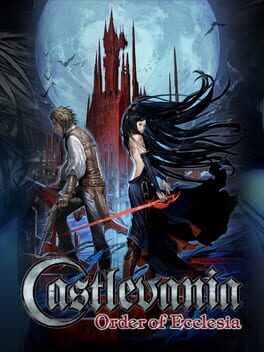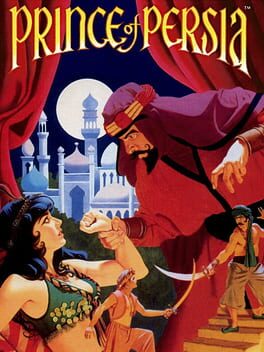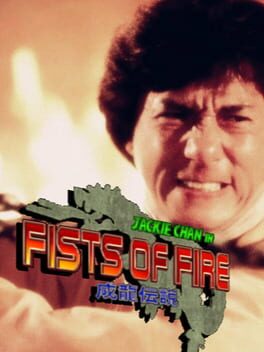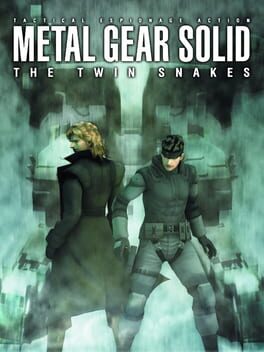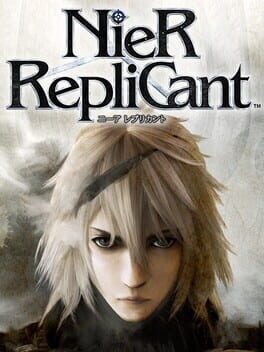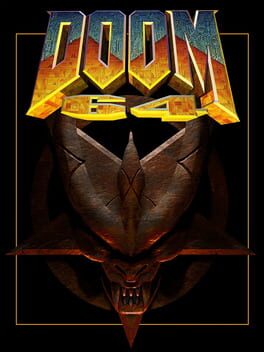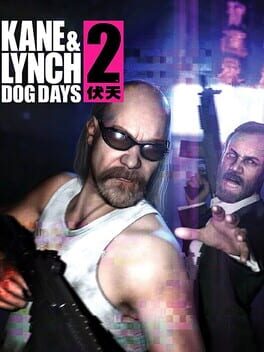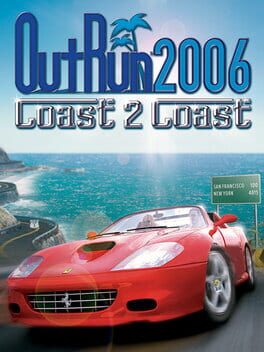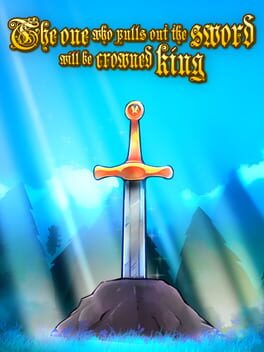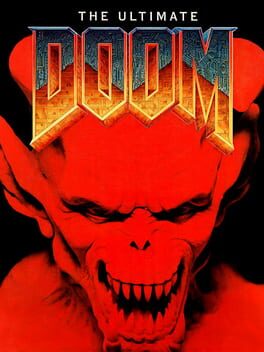mutyumu
2016
Part of the appeal of the classic Castlevania games that was sadly lost in the transition to the newer games focused on exploration - commonly called Igavanias - was the difficulty.
While the exploration aspect of Igavanias is fun, what I most enjoy about them remains the same thing I love about the classic Castlevanias - the music, the combat and the atmosphere.
For me to enjoy a combat system to its fullest there has to be some sort of challenge in which I can measure my improvement so that's where the Igavanias I have played before fail for me... and why I played Order of Ecclesia before the other games as I heard this was the hardest Igavania.
Order of Ecclesia takes a more linear approach to level design but it still incorporates exploration to smaller degrees which works better for playing in short bursts - perfect for a portable console.
The benefit of the game being more linear is that the combat is better balanced and some bosses can pose a genuine threat to your patience. Speaking of which, I found all of the bosses to be creatively designed and fun to fight against; the enemy variety was also good.
Even without taking the difficulty into account, I really enjoy the combat with the glyph system which lets you experiment with two different weapons/spells- or two of the same - and rewards you for attacking with one and then the other; this adds a small layer of mechanical complexity.
Because Shanoa is going to all sorts of different places saving villagers the atmosphere doesn't have to limit itself to "Dracula's Castle" and while I don't think this is necessarily better, it is interesting to see something different and it was perfectly executed.
Gamer moment but it's also easy to enjoy this when the soundtrack is this good and Shanoa is hot.
While the exploration aspect of Igavanias is fun, what I most enjoy about them remains the same thing I love about the classic Castlevanias - the music, the combat and the atmosphere.
For me to enjoy a combat system to its fullest there has to be some sort of challenge in which I can measure my improvement so that's where the Igavanias I have played before fail for me... and why I played Order of Ecclesia before the other games as I heard this was the hardest Igavania.
Order of Ecclesia takes a more linear approach to level design but it still incorporates exploration to smaller degrees which works better for playing in short bursts - perfect for a portable console.
The benefit of the game being more linear is that the combat is better balanced and some bosses can pose a genuine threat to your patience. Speaking of which, I found all of the bosses to be creatively designed and fun to fight against; the enemy variety was also good.
Even without taking the difficulty into account, I really enjoy the combat with the glyph system which lets you experiment with two different weapons/spells- or two of the same - and rewards you for attacking with one and then the other; this adds a small layer of mechanical complexity.
Because Shanoa is going to all sorts of different places saving villagers the atmosphere doesn't have to limit itself to "Dracula's Castle" and while I don't think this is necessarily better, it is interesting to see something different and it was perfectly executed.
Gamer moment but it's also easy to enjoy this when the soundtrack is this good and Shanoa is hot.
1989
Even without considering the technical feats achieved by Jordan Mechner in Prince of Persia (please watch the Ars Technica video if you are interested) this is still a masterpiece by design alone.
I love how you are left alone to figure out what to do - there's so many mechanics and how you interact with your environment/enemies is a lot more than "walk here" or "slash this enemy". The 60 minute time limit is perfect to give you a sense of urgency - it fits the narrative considering your hot Persian girlfriend is in danger.
To be able to beat this not only your puzzle-solving skills have to be on point but also your execution which is the perfect harmony for me. A very dangerous place, you need to tread lightly as death is always around the corner but at the same time you only have so much time so you need to have a sense of balance when it comes to how much time you have left and how likely you are to die if you rush into something. In any case you will die a lot - the 60-minute timer will finish a lot of times before you are able to beat this but to do so is incredibly rewarding.
Then you also have the fluid animations and beautiful minimalistic aesthetic of the Apple II version or DOS/Amiga ports.
Incredibly surprised by Prince of Persia - it has everything I love in video games.
I love how you are left alone to figure out what to do - there's so many mechanics and how you interact with your environment/enemies is a lot more than "walk here" or "slash this enemy". The 60 minute time limit is perfect to give you a sense of urgency - it fits the narrative considering your hot Persian girlfriend is in danger.
To be able to beat this not only your puzzle-solving skills have to be on point but also your execution which is the perfect harmony for me. A very dangerous place, you need to tread lightly as death is always around the corner but at the same time you only have so much time so you need to have a sense of balance when it comes to how much time you have left and how likely you are to die if you rush into something. In any case you will die a lot - the 60-minute timer will finish a lot of times before you are able to beat this but to do so is incredibly rewarding.
Then you also have the fluid animations and beautiful minimalistic aesthetic of the Apple II version or DOS/Amiga ports.
Incredibly surprised by Prince of Persia - it has everything I love in video games.
Extreme Make Over: Metal Gear Solid Edition
A remake? No, this is a parody and a love letter to action films.
How do you make a parody of Metal Gear Solid? The original game is already self-aware and self-indulgent to an extreme - always making you laugh with things like the writing, the way Meryl walks, Otacon pissing himself and perhaps more plot-twists than in a Yakuza game.
I read this was originally going to be more faithful to the original but Kojima didn't like the idea and did everything in his power in order to make it different, going so far as to handpicking the cutscene director - Ryuhei Kitamura.
The beautiful and melancholic soundtrack of the original was replaced for more of a generic action movie soundtrack but it fits the tone of what this project was going for so I don't have any problems with that.
The only problem I have with this is how they didn't remake the level design to account for the gameplay changes they exported from MGS2 - it makes the gameplay asinine. But perhaps this is what they were going for? For you to disconnect your brain and just have a laugh? Still, I would have liked to be more surprised with level design changes like in REmake.
In an era where we are plagued by inoffensive remakes and the only thing they do is be the same game but with more polygons and different lighting - The Twin Snakes justifies its existence by presenting itself as a parody and something different.
When I'm in the mood for something pretty and challenging I will play Metal Gear Solid 1; when I only feel like disconnecting my brain and having a laugh I will play The Twin Snakes.
A remake? No, this is a parody and a love letter to action films.
How do you make a parody of Metal Gear Solid? The original game is already self-aware and self-indulgent to an extreme - always making you laugh with things like the writing, the way Meryl walks, Otacon pissing himself and perhaps more plot-twists than in a Yakuza game.
I read this was originally going to be more faithful to the original but Kojima didn't like the idea and did everything in his power in order to make it different, going so far as to handpicking the cutscene director - Ryuhei Kitamura.
The beautiful and melancholic soundtrack of the original was replaced for more of a generic action movie soundtrack but it fits the tone of what this project was going for so I don't have any problems with that.
The only problem I have with this is how they didn't remake the level design to account for the gameplay changes they exported from MGS2 - it makes the gameplay asinine. But perhaps this is what they were going for? For you to disconnect your brain and just have a laugh? Still, I would have liked to be more surprised with level design changes like in REmake.
In an era where we are plagued by inoffensive remakes and the only thing they do is be the same game but with more polygons and different lighting - The Twin Snakes justifies its existence by presenting itself as a parody and something different.
When I'm in the mood for something pretty and challenging I will play Metal Gear Solid 1; when I only feel like disconnecting my brain and having a laugh I will play The Twin Snakes.
2016
Never has a videogame -or anything else for that matter- made me feel and care so much for an AI.
I always wanted a dog growing up but my parents were not okay with it - I feel like The Last Guardian filled that small void in my childhood memories.
Did I sayAI? Scratch that, my heart doesn't feel right when calling Trico that ugly word.
I always wanted a dog growing up but my parents were not okay with it - I feel like The Last Guardian filled that small void in my childhood memories.
Did I say
2010
Preface: Thanks a lot to Andria for working on the fan-localization patch! I feel more connected to brother NieR having a sister myself. :)
The soundtrack is one of the most beautiful OSTs I have ever listened to. The emphasis on the percussions and vocals make for something that feels really unique.
On the gameplay side, I really enjoyed the variety of experiences I had outside of normal combat or quests - especially the visual novel segments which I didn't expect, almost as ridiculous as the +1 hour text dump you start getting on Route B. The combat is not stellar but it's serviceable.
Let's get this out of the way, the big majority of quests in NieR are not fun to do. Having said that, I don't necessarily feel negative about them - why? Helping people is not always fun and it makes sense for NieR to have this element considering the message it's going for.
Speaking about this, maybe I'm just a psychopath but I can't really connect with NieR's message of empathy in how they present it. Themes are not as heavy-handed and on-the-nose as in Automata but I still find NieR's lack of subtlety to be a little too much for me.
The soundtrack is one of the most beautiful OSTs I have ever listened to. The emphasis on the percussions and vocals make for something that feels really unique.
On the gameplay side, I really enjoyed the variety of experiences I had outside of normal combat or quests - especially the visual novel segments which I didn't expect, almost as ridiculous as the +1 hour text dump you start getting on Route B. The combat is not stellar but it's serviceable.
Let's get this out of the way, the big majority of quests in NieR are not fun to do. Having said that, I don't necessarily feel negative about them - why? Helping people is not always fun and it makes sense for NieR to have this element considering the message it's going for.
Speaking about this, maybe I'm just a psychopath but I can't really connect with NieR's message of empathy in how they present it. Themes are not as heavy-handed and on-the-nose as in Automata but I still find NieR's lack of subtlety to be a little too much for me.
1997
Verticality is mostly always seen as indication of good and creative level design in the video game sphere - this is especially true for platformers for which I can see the case being made but I do think that holding this as some sort of universal fact limits creativity and can make everything feel the same; when all the designers are striking for the same goal of verticality it can all start feeling ridiculous.
I wouldn't say verticality always conducts to good level design. Point in case is the DOOM franchise, where my favorite official maps to date are still those designed by John Romero for Episode 1 (1993) which do have this element but it's restrained to the point of working well with the nuances of classic DOOM gameplay or even Sandy Petersen's Mt. Erebus where most of the enemy encounters happen in a horizontal fashion.
When this element gets out of hand you get things like Industrial Zone for Doom II which I appreciate for existing for being so ridiculous, having enemies on top of skyscrapers shooting at you and then having to jump off buildings to reach the bit of land where you need to go is interesting but it's not fun on the whole - all of this in a game where you cannot look up or down.
On this same line of thought, corridor and maze-like levels in first-person shooters are often seen as something boring and indicative of bad design but I especially don't agree with this at all.
DOOM 64 had to work with the limitations of the N64 which is partly the reason that there's an emphasis on back-tracking, compact level design (which conduct to what people call corridor-like/maze-like) and even absense of verticality.
Instead of a "DOOM lite" coming out of these limitations, the developers justified these elements by giving DOOM 64 an atmospheric and survival horror spin. Whereas 1993 and DOOM II are a gamer fantasy of being an overpowered macho marine listening to heavy metal and blasting through hordes of demons (okay maybe DOOM II on UV not so much); 64 exists to oppress you, scare you and make you realize you had claustrophobia all along and need a big open space to breath some fresh air.
The soundtrack was changed from renditions of heavy metal classics to oppressive atmospheric sounds. Deciding not to go with these dopamine-inducing tracks was a great choice thematically for 64, it does play with the theme of you being somewhere you don't really belong. Just have a listen to Final Outpost for example
I love the art design for 64: the darker color palette, the environments, the weapons and enemy re-design were all done incredibly well. My favorite redesigns probably being the Imp and the Pain Elemental, Nightmare Imps are also a really cool new addition.
Difficulty is also really important for me, I usually enjoy challenging things. I would say the hardest difficulty level of 64 (Watch Me Die!) sits somewhere in between DOOM II's UV and 1993's UV (closer to the latter) so I was not disappointed in this regard. I did play Sunlust on UV (cbt) before this so my concept of difficulty might be a little distorted.
The only reason I'm not giving this 5 stars is because I did feel the levels had some predictability to them, maybe a byproduct of me already having beaten 1993, DOOM II and Sunlust so it's harder to surprise me. I still miss that feeling of wonder and surprise that 1993 gave me though so that one is still my favorite.
I wouldn't say verticality always conducts to good level design. Point in case is the DOOM franchise, where my favorite official maps to date are still those designed by John Romero for Episode 1 (1993) which do have this element but it's restrained to the point of working well with the nuances of classic DOOM gameplay or even Sandy Petersen's Mt. Erebus where most of the enemy encounters happen in a horizontal fashion.
When this element gets out of hand you get things like Industrial Zone for Doom II which I appreciate for existing for being so ridiculous, having enemies on top of skyscrapers shooting at you and then having to jump off buildings to reach the bit of land where you need to go is interesting but it's not fun on the whole - all of this in a game where you cannot look up or down.
On this same line of thought, corridor and maze-like levels in first-person shooters are often seen as something boring and indicative of bad design but I especially don't agree with this at all.
DOOM 64 had to work with the limitations of the N64 which is partly the reason that there's an emphasis on back-tracking, compact level design (which conduct to what people call corridor-like/maze-like) and even absense of verticality.
Instead of a "DOOM lite" coming out of these limitations, the developers justified these elements by giving DOOM 64 an atmospheric and survival horror spin. Whereas 1993 and DOOM II are a gamer fantasy of being an overpowered macho marine listening to heavy metal and blasting through hordes of demons (okay maybe DOOM II on UV not so much); 64 exists to oppress you, scare you and make you realize you had claustrophobia all along and need a big open space to breath some fresh air.
The soundtrack was changed from renditions of heavy metal classics to oppressive atmospheric sounds. Deciding not to go with these dopamine-inducing tracks was a great choice thematically for 64, it does play with the theme of you being somewhere you don't really belong. Just have a listen to Final Outpost for example
I love the art design for 64: the darker color palette, the environments, the weapons and enemy re-design were all done incredibly well. My favorite redesigns probably being the Imp and the Pain Elemental, Nightmare Imps are also a really cool new addition.
Difficulty is also really important for me, I usually enjoy challenging things. I would say the hardest difficulty level of 64 (Watch Me Die!) sits somewhere in between DOOM II's UV and 1993's UV (closer to the latter) so I was not disappointed in this regard. I did play Sunlust on UV (cbt) before this so my concept of difficulty might be a little distorted.
The only reason I'm not giving this 5 stars is because I did feel the levels had some predictability to them, maybe a byproduct of me already having beaten 1993, DOOM II and Sunlust so it's harder to surprise me. I still miss that feeling of wonder and surprise that 1993 gave me though so that one is still my favorite.
Digital photography capturing the heavy caliber plowing through the neon-infested air of Shanghai; fuck your eardrums and motion sickness.
Dead Men was clearly inspired by Mann's Heat in some set pieces: the bank heist, the nightclub - which was my favorite part of that game by far - and the shooting in the streets of Tokyo. It had some redeeming qualities but other than feeling like a homage to Mann it didn't get many things right - the dialogue comes to mind.
Dog Days while still being heavily inspired by Mann's cinematography - the use of digital photography in films such as Collateral or Miami Vice - feels like its own thing where everything fell right into place.
The emulation of digital photography is very beautiful and creative - the depth of field, the bokeh, grain (actually noise!), the use of overexposure and a really smart choice of color grading are implented masterfully but Kane and Lynch 2 goes beyond this to present us with very distinct visuals and a nauseating mood: the invisible cameraman struggling to document all of this. To add to this, the camera glitching when you get shot, the hitmarkers getting displayed on the bodies you shoot instead of on your invisible crosshair, the display of water droplets and blood splattered to the lenses were a nice artistic choice as well.
Ironically, this beautifully-crafted digital camera presents us with very ugly things - two psychopaths, sweat shops, corruption, poverty, mutilated persons, innocent people dying and dead naked women in the middle of busy streets. In all of this uglyness, there is some regard for human decency and some elements are masked by pixel censoring: namely these naked women and when you deface the face (sorry) of someone with a shotgun.
It all feels like a long hallway through the deepest place of hell - the nauseauting feeling of a camera struggling to capture this, the worst of human uglyness, the linearity of the levels and the thunderous sound of bullets coming from everywhere - it almost makes you want to vomit.
There's no pretensions about morality in Dog Days as opposed to some dialogues from the first entry - both protagonists just accept what is happening and just push-on as they follow the "the end justifies the means" ethos but for purely selfish gains. There are many moments where this can be seen but one of the best is when they find some hostages in the back of a shop, one of them acknowledges their existence but the other screams something along the lines of "it's not my problem!" which perfectly fits their characters.
Another thing I thought was cool was the fact that most "cinematic moments" happen through gameplay mechanics and with what you are presented from the beginning rather than a cutscene which feels very honest.
It all feels like a collage of violence since you usually don't see what happens behind Kane and Lynch going from one place to the next, you are just placed there to shoot people and get to the end of this nightmare.
On the sound design, it follows the sound signature of Mann's deafening bullets but at the same time it does its own thing by allowing the environments to play the rest of the soundtrack - I simply love it. All of the vocal tracks being in Chinese only enhance the soundtrack if anything.
As for the gameplay, it refined the movement and shooting of its predecessor - a pretty standard third person shooter but I enjoy those so nothing to complain about.
There is nothing else like this in existence and it's still surprising that Square Enix gave all this creative freedom to IO Interactive.
Dead Men was clearly inspired by Mann's Heat in some set pieces: the bank heist, the nightclub - which was my favorite part of that game by far - and the shooting in the streets of Tokyo. It had some redeeming qualities but other than feeling like a homage to Mann it didn't get many things right - the dialogue comes to mind.
Dog Days while still being heavily inspired by Mann's cinematography - the use of digital photography in films such as Collateral or Miami Vice - feels like its own thing where everything fell right into place.
The emulation of digital photography is very beautiful and creative - the depth of field, the bokeh, grain (actually noise!), the use of overexposure and a really smart choice of color grading are implented masterfully but Kane and Lynch 2 goes beyond this to present us with very distinct visuals and a nauseating mood: the invisible cameraman struggling to document all of this. To add to this, the camera glitching when you get shot, the hitmarkers getting displayed on the bodies you shoot instead of on your invisible crosshair, the display of water droplets and blood splattered to the lenses were a nice artistic choice as well.
Ironically, this beautifully-crafted digital camera presents us with very ugly things - two psychopaths, sweat shops, corruption, poverty, mutilated persons, innocent people dying and dead naked women in the middle of busy streets. In all of this uglyness, there is some regard for human decency and some elements are masked by pixel censoring: namely these naked women and when you deface the face (sorry) of someone with a shotgun.
It all feels like a long hallway through the deepest place of hell - the nauseauting feeling of a camera struggling to capture this, the worst of human uglyness, the linearity of the levels and the thunderous sound of bullets coming from everywhere - it almost makes you want to vomit.
There's no pretensions about morality in Dog Days as opposed to some dialogues from the first entry - both protagonists just accept what is happening and just push-on as they follow the "the end justifies the means" ethos but for purely selfish gains. There are many moments where this can be seen but one of the best is when they find some hostages in the back of a shop, one of them acknowledges their existence but the other screams something along the lines of "it's not my problem!" which perfectly fits their characters.
Another thing I thought was cool was the fact that most "cinematic moments" happen through gameplay mechanics and with what you are presented from the beginning rather than a cutscene which feels very honest.
It all feels like a collage of violence since you usually don't see what happens behind Kane and Lynch going from one place to the next, you are just placed there to shoot people and get to the end of this nightmare.
On the sound design, it follows the sound signature of Mann's deafening bullets but at the same time it does its own thing by allowing the environments to play the rest of the soundtrack - I simply love it. All of the vocal tracks being in Chinese only enhance the soundtrack if anything.
As for the gameplay, it refined the movement and shooting of its predecessor - a pretty standard third person shooter but I enjoy those so nothing to complain about.
There is nothing else like this in existence and it's still surprising that Square Enix gave all this creative freedom to IO Interactive.
2003
This review contains spoilers
A beautiful work on the potential of children - two kids raised by the same mother: one with love and the other with hatred.
Seere ended up emulating the hero he admired from the fairy tales of his mother -the 'little hero'- and played an irreplaceable part in the saving of the World.
Manah was abused and did the only thing that was taught to her: to destroy - this led to the collapse of everything as it was known.
Arioch sacrificed the possibility of having children by making a pact with two elemental spirits. With her child gone to the war and an impossibility to create any more life within her she goes mad and becomes a child-eater - probably due to jealousy "my child was taken away from me and I cannot have any more, therefore it's not fair for any other person to have the privilege of their children living".
Some interesting symbolism I found about these two spirits is that they resemble the ovaries of a woman which play an important part in the making of a human being.
It was very subtly told overtime but Leonard was a pedophile (from what I have read this was more explicit in the Japanese version) but it was made more obvious with the cutscene for ending E where Seere hugs him and his reaction is surprisingly descriptive - it seems as if he wants to give in to his urges but ends up resisting; probably due to the memories of his little brothers which he regrets.
These last two might be bit of a stretch but here's my interpretation of it:
Furiae was in love with his brother Caim, as we know incest can lead to genetic disorders in children - the World itself is not fair but on top of that genetic disorders bring a lot of complications on children to live a normal life and adapt to society.
Caim has bloodlust and no compassion for human lives - it's a war so there will be bloodshed but he actively enjoys it disregarding the children he is leaving fatherless and the human on the other side of the War. Something that Angelus and other characters constantly ask of him agaisnt the enemies is for mercy.
There's so much symbolism but I was comfortable with some of my interpretations of it after seeing how the Watchers resemble giant babies. There's also a surprising amount of depth to the characters and different endings.
The soundtrack is beautiful: the abrupt repetition of samples alludes to the repetition of slaughter in the field - this is especially felt while playing with Caim on the ground.
Onto the gameplay: I'm not a fan of musou games but I grew to like the ground combat because of the experimentation of different weapons and I think it was brilliant from a ludo-narrative stand-point to get to know Caim.
I straight up loved the combat with Angelus, so much so that Panzer Dragoon has increased some priority spots in my to-play list.
As if this wasn't obvious with some elements you can find in Drakengard this was named Project Dragonsphere due to drawing heavy inspiration from Ace Combat 3, I was surprised to see so many things that reminded me of it: the canyon which is kind of a small labyrinth as it was in AC3, the city in its demise is also reminiscent to how the city looked in some of the endings (or all of them? I cannot recall) of AC3, the extra expedition where you can fight against fighter jets, the gameplay of Angelus itself, the sometimes atmospheric and electronic soundtrack, etc.
There are so many things I probably missed about Drakengard but that's also the beauty of it, I was really surprised with how much I loved the story and that I ended up enjoying the gameplay. Now I'm shilling this game to my friends.
On another note - sometimes it might be worth asking yourself: can this work as effectively as it is if it was a film or a work in another medium? In the case of Drakengard, I don't think so.
Some personal notes:
This was my previous review for Drakengard but I have been re-playing some games I used to dismiss (e.g. ICO) because of my lack of patience with positive results; it feels like growing as a person.
With how much I loved Drakengard, I will play the rest of the series (including Nier) and eventually re-play Nier Automata (I did not enjoy this last one as much but I want to revisit it)
I also had some things to say about how Caim doesn't care about the unethical behavior of the people helping him to achieve his goals but because of being so focused on saving Furiae he disregards this. This eventually comes back to bite him in the tail...
Seere ended up emulating the hero he admired from the fairy tales of his mother -the 'little hero'- and played an irreplaceable part in the saving of the World.
Manah was abused and did the only thing that was taught to her: to destroy - this led to the collapse of everything as it was known.
Arioch sacrificed the possibility of having children by making a pact with two elemental spirits. With her child gone to the war and an impossibility to create any more life within her she goes mad and becomes a child-eater - probably due to jealousy "my child was taken away from me and I cannot have any more, therefore it's not fair for any other person to have the privilege of their children living".
Some interesting symbolism I found about these two spirits is that they resemble the ovaries of a woman which play an important part in the making of a human being.
It was very subtly told overtime but Leonard was a pedophile (from what I have read this was more explicit in the Japanese version) but it was made more obvious with the cutscene for ending E where Seere hugs him and his reaction is surprisingly descriptive - it seems as if he wants to give in to his urges but ends up resisting; probably due to the memories of his little brothers which he regrets.
These last two might be bit of a stretch but here's my interpretation of it:
Furiae was in love with his brother Caim, as we know incest can lead to genetic disorders in children - the World itself is not fair but on top of that genetic disorders bring a lot of complications on children to live a normal life and adapt to society.
Caim has bloodlust and no compassion for human lives - it's a war so there will be bloodshed but he actively enjoys it disregarding the children he is leaving fatherless and the human on the other side of the War. Something that Angelus and other characters constantly ask of him agaisnt the enemies is for mercy.
There's so much symbolism but I was comfortable with some of my interpretations of it after seeing how the Watchers resemble giant babies. There's also a surprising amount of depth to the characters and different endings.
The soundtrack is beautiful: the abrupt repetition of samples alludes to the repetition of slaughter in the field - this is especially felt while playing with Caim on the ground.
Onto the gameplay: I'm not a fan of musou games but I grew to like the ground combat because of the experimentation of different weapons and I think it was brilliant from a ludo-narrative stand-point to get to know Caim.
I straight up loved the combat with Angelus, so much so that Panzer Dragoon has increased some priority spots in my to-play list.
As if this wasn't obvious with some elements you can find in Drakengard this was named Project Dragonsphere due to drawing heavy inspiration from Ace Combat 3, I was surprised to see so many things that reminded me of it: the canyon which is kind of a small labyrinth as it was in AC3, the city in its demise is also reminiscent to how the city looked in some of the endings (or all of them? I cannot recall) of AC3, the extra expedition where you can fight against fighter jets, the gameplay of Angelus itself, the sometimes atmospheric and electronic soundtrack, etc.
There are so many things I probably missed about Drakengard but that's also the beauty of it, I was really surprised with how much I loved the story and that I ended up enjoying the gameplay. Now I'm shilling this game to my friends.
On another note - sometimes it might be worth asking yourself: can this work as effectively as it is if it was a film or a work in another medium? In the case of Drakengard, I don't think so.
Some personal notes:
This was my previous review for Drakengard but I have been re-playing some games I used to dismiss (e.g. ICO) because of my lack of patience with positive results; it feels like growing as a person.
With how much I loved Drakengard, I will play the rest of the series (including Nier) and eventually re-play Nier Automata (I did not enjoy this last one as much but I want to revisit it)
I also had some things to say about how Caim doesn't care about the unethical behavior of the people helping him to achieve his goals but because of being so focused on saving Furiae he disregards this. This eventually comes back to bite him in the tail...
1995
1993
